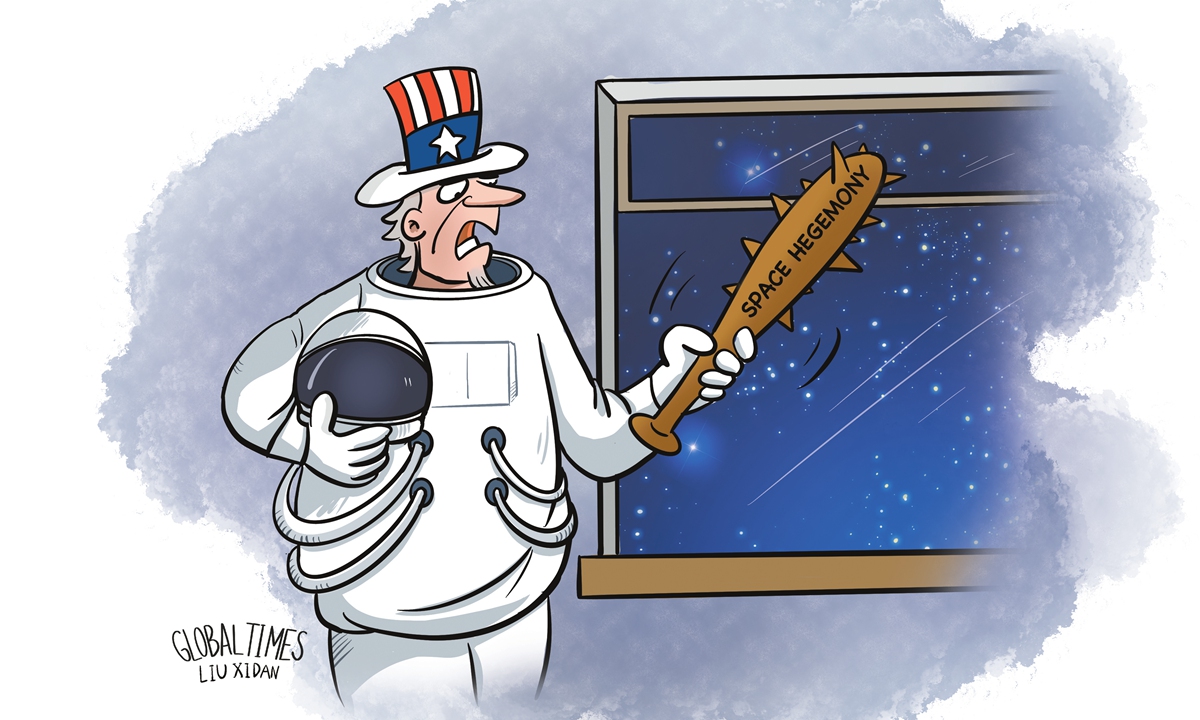US seeks to extend hegemony to outer space by hyping unfounded ‘China threat’ claim

Illustration:Liu Xidan/GT
The US is searching for justifications for a space arms race. Recently, the US Senate held a hearing titled "There's a Bad Moon on the Rise: Why Congress and NASA Must Thwart China in the Space Race," which again hyped the "China threat" narrative. However, this unfounded accusation against China was effectively rebuked on Friday, when China announced its plan of a kinetic impact demonstration mission on an asteroid to verify the feasibility of asteroid defense solutions for the shared security of humanity. These developments clearly show that while China strives to defend humanity, the US engages in warmongering.
An analysis about the US Senate hearing from a US think tank further laid bare the US' intention with the headline: "Authoritarians in space? More reason to beat China in arms race." Reading the title alone, one cannot help but believes a space war could erupt at any moment. Officials and representatives from defense contractors at the hearing even bluntly claimed that it's "not a matter of 'if,' but 'when' war with Beijing will take place in the outer atmosphere," according to the analysis from Responsible Statecraft, the online magazine of US think tank the Quincy Institute.
China has been described as the "sole and dangerous rival" in competing for key lunar regions and resources. Speakers at the hearing called for the US to accelerate a new wave of lunar development and weaponized deployments to ensure absolute security and superiority.
The reality of space technology development and related policies suggest that Washington's accusations against China are far more applicable to the US itself. US space strategies and activities - not China's - are what is posing serious risks of war in space, and the US is clearly trying to project onto China the very mindset with which the US approaches space technology advancement and its strategic aim.
The space activities that the US accuses China of - from militarized deployments to pursuing critical resources to expanding alliance networks and intelligence capabilities - are precisely what the US itself has been doing all along. The establishment of the US Space Force, the pursuit of lunar resource claims and repeated anti-satellite weapon drills are all plain facts, not aimed at peace but at war - to dominate space through space warfare and extend US hegemony to the outer space.
Why must the US control space? And why is its space expansion equated with "maintaining peace"? This logic, carried over from the Cold War era to today, is essentially old wine in a new bottle of hegemonic thinking.
The US began its process of space weaponization as early as the mid-1980s, and it has accelerated ever since. From resource competition to arms deployments to manipulating geopolitical dynamics, these have been the core strategies the US has pursued for decades. By the US logic, what is truly worrying is the US-led weaponization of space.
In contrast, China's approach focuses on security and development of all humanity. For example, the recently announced asteroid impact mission is fundamentally defensive - a responsible scientific endeavor focused on safeguarding the shared security of all humanity. Asteroid collision threats are absolute risks that any nation could face. China has chosen to independently advance this small-body impact demonstration and verification using its own research capabilities and funding, while openly sharing early warning mechanisms and observation data. This is a rational choice at the forefront of human self-protection.
Moreover, China has publicly called on all nations to oppose space weaponization, submitted multiple proposals for the Prevention of an Arms Race in Outer Space, and proposed global sharing of space stations and scientific data.
Clearly, by pushing the "China threat" in space narrative in such high-profile manners, the US essentially aims to legitimize its own expansion of space armaments and to secure more budgets. By stoking fears of China, it enables Congress to give industries massive investments, channeling entire societal resources toward militarization. The inevitable outcome is that the US itself becomes the architect of war.
History has repeatedly shown that hegemonic powers continually create imaginary enemies, equip armies, elevate war preparations and use the pretext of maintaining peace to justify their expansion - but the result is often self-destruction.
An arms race is not a talisman for protection but a trap of self-consumption. The logic of arms races ultimately leads to self-inflicted decline. The outer space belongs to no single nation, and there certainly is no room for hegemony. No matter how vast the outer space may be, hegemony suffocates only itself.
Photos
Related Stories
- Washington, D.C. sues Trump administration over National Guard deployment
- Trump offers more U.S. troops to Poland
- U.S. Florida plans to eliminate all vaccine mandates, drawing criticism
- U.S. federal judge sides with Harvard in lawsuit over Trump administration funding freeze
- The US 'welcoming Chinese students' should not be mere lip service: Global Times editorial
Copyright © 2025 People's Daily Online. All Rights Reserved.









